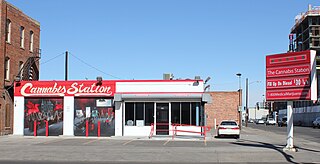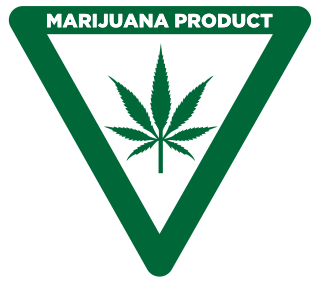Related Research Articles

Proposition 215, or the Compassionate Use Act of 1996, is a California law permitting the use of medical cannabis despite marijuana's lack of the normal Food and Drug Administration testing for safety and efficacy. It was enacted, on November 5, 1996, by means of the initiative process, and passed with 5,382,915 (55.6%) votes in favor and 4,301,960 (44.4%) against.

The Marijuana Policy Project (MPP) is the largest organization working solely on marijuana policy reform in the United States in terms of its budget, number of members, and staff.

Mary Jane Rathbun, popularly known as Brownie Mary, was an American medical cannabis rights activist. As a hospital volunteer at San Francisco General Hospital, she became known for baking and distributing cannabis brownies to AIDS patients. Along with activist Dennis Peron, Rathbun lobbied for the legalization of cannabis for medical use, and she helped pass San Francisco Proposition P (1991) and California Proposition 215 (1996) to achieve those goals. She also contributed to the establishment of the San Francisco Cannabis Buyers Club, the first medical cannabis dispensary in the United States.

Steven Wynn "Steve" Kubby was a Libertarian Party activist who played a key role in the drafting and passage of California Proposition 215. The proposition was a ballot initiative to legalize medical marijuana which was approved by voters in 1996. Kubby was known as a cancer patient who relied on medical cannabis.
Oaksterdam is a cultural district on the north end of Downtown Oakland, California, where medical cannabis is available for purchase in cafés, clubs, and patient dispensaries. Oaksterdam is located between downtown proper, the Lakeside, and the financial district. It is roughly bordered by 14th Street on the southwest, Harrison Street on the southeast, 19th Street on the northeast, and Telegraph Avenue on the northwest. The name is a portmanteau of "Oakland" and "Amsterdam," due to the Dutch city's cannabis coffee shops and the drug policy of the Netherlands.
The San Francisco Cannabis Buyers Club was the first public medical cannabis dispensary in the United States. Gay rights and AIDS activists were responsible for its founding and the larger success of the buyers club movement in the 1990s. Historically, the buyers club model emerged partly in response to the global pandemic of HIV/AIDS, and the failure of the U.S. government to allow the gay community and people suffering from other illnesses such as cancer, to legally use cannabis as palliative medicine. The club operated intermittently in at least three separate locations from 1991 to 1998, when it was permanently closed.

Dennis Robert Peron was an American activist and businessman who became a leader in the movement for the legalization of cannabis throughout the 1990s. He influenced many in California and thus changed the political debate on marijuana in the United States.

In the United States, increased restrictions and labeling of cannabis as a poison began in many states from 1906 onward, and outright prohibitions began in the 1920s. By the mid-1930s cannabis was regulated as a drug in every state, including 35 states that adopted the Uniform State Narcotic Drug Act. The first national regulation was the Marihuana Tax Act of 1937.
Valerie Leveroni Corral is an American medical cannabis activist and writer. As a young adult she experienced a traumatic head injury that left her with a seizure disorder that antiepileptic medication could not ameliorate. Her experimental use of cannabis to treat her seizures led her to grow it on her property in Santa Cruz, California. In 1992, she was arrested for cannabis cultivation, becoming the first person in that state to argue the medical necessity defense. Following her success, she founded the Wo/Men's Alliance for Medical Marijuana (WAMM) and was a coauthor of Proposition 215, the first medical cannabis state ballot initiative to pass in the United States.

In the United States, the use of cannabis for medical purposes is legal in 38 states, four out of five permanently inhabited U.S. territories, and the District of Columbia, as of March 2023. Ten other states have more restrictive laws limiting THC content, for the purpose of allowing access to products that are rich in cannabidiol (CBD), a non-psychoactive component of cannabis. There is significant variation in medical cannabis laws from state to state, including how it is produced and distributed, how it can be consumed, and what medical conditions it can be used for.
Oaksterdam University is an unaccredited trade school located in Oakland, California. It was founded in 2007 by marijuana rights activist Richard Lee. The school offers asynchronous, online, and in-person courses covering cannabis horticulture, the business of cannabis, cannabis extraction and manufacturing, and bud-tending.

Cannabis in California has been legal for medical use since 1996, and for recreational use since late 2016. The state of California has been at the forefront of efforts to liberalize cannabis laws in the United States, beginning in 1972 with the nation's first ballot initiative attempting to legalize cannabis. Although it was unsuccessful, California would later become the first state to legalize medical cannabis through the Compassionate Use Act of 1996, which passed with 56% voter approval. In November 2016, California voters approved the Adult Use of Marijuana Act with 57% of the vote, which legalized the recreational use of cannabis.

California Proposition 19 was a ballot initiative on the November 2, 2010, statewide ballot. It was defeated, with 53.5% of California voters voting "No" and 46.5% voting "Yes." If passed, it would have legalized various marijuana-related activities, allowed local governments to regulate these activities, permitted local governments to impose and collect marijuana-related fees and taxes, and authorized various criminal and civil penalties. In March 2010, it qualified to be on the November statewide ballot. The proposition required a simple majority in order to pass, and would have taken effect the day after the election. Yes on 19 was the official advocacy group for the initiative and California Public Safety Institute: No On Proposition 19 was the official opposition group.

Scott Feil is an American medical cannabis rights activist, complex aircraft pilot, and businessman. Most known for his involvement in the continuing court case involving Los Angeles Police Department illegal seizure of 209 pounds (95 kg) of medical marijuana, 21 pounds (9.5 kg) of hashish, 12 pounds (5.4 kg) of marijuana oil and $186,416.00 from his Los Angeles based United Medical Caregivers Clinic medical cannabis dispensary, UMCC LLC.

Cannabis dispensaries in the United States or marijuana dispensaries are a type of cannabis retail outlet, local government-regulated physical location, typically inside a retail storefront or office building, in which a person can purchase cannabis and cannabis-related items for medical or recreational use.

The Adult Use of Marijuana Act (AUMA) was a 2016 voter initiative to legalize cannabis in California. The full name is the Control, Regulate and Tax Adult Use of Marijuana Act. The initiative passed with 57% voter approval and became law on November 9, 2016, leading to recreational cannabis sales in California by January 2018.

Cannabis in Arizona is legal for recreational use. A 2020 initiative to legalize recreational use passed with 60% of the vote. Possession and cultivation of recreational cannabis became legal on November 30, 2020, with the first state-licensed sales occurring on January 22, 2021.

Cannabis in Michigan is legal for recreational use. A 2018 initiative to legalize recreational use passed with 56% of the vote. State-licensed sales of recreational cannabis began in December 2019.
Mary Elaine Gennoy was an American activist for LGBT rights, disability rights, and marijuana legalization, based in San Francisco.
The Berkeley Patients Group (BPG) is the oldest continuously operating cannabis dispensary in the United States, inaugurated in 1999 in Berkeley, California. BPG has been known not only for cannabis dispensation, but also for its involvement in advocacy campaigns for cannabis policy reforms and the rights of patients using marijuana for medical purposes, and for its involvement with the scientific community.
References
- 1 2 3 "The LGBTQAI+ Activists Who Drove Cannabis Legalization Forward (And Why We Wouldn't Have Legal Weed Without Them)". finance.yahoo.com. Retrieved 2022-10-19.
- ↑ "8 LGBTQ+ Cannabis Leaders Tell Us Who Gives Them Pride". www.advocate.com. 2020-06-26. Retrieved 2022-10-19.
- ↑ Hensley, Scott (2009-08-13). "How Medical Is The Marijuana In California?". NPR. Retrieved 2022-10-31.
- 1 2 "Brief History of Medical Cannabis in San Francisco During the 90's". Mission Cannabis Club | Cannabis Dispensary and Delivery San Francisco CA. 2020-04-10. Retrieved 2022-10-21.
- ↑ Evans, Mark (1996-12-01). "Force Behind Proposition 215 Says His Push Began as 'Legacy of Love'". Los Angeles Times. Retrieved 2022-11-07.
- 1 2 3 Ocamb, Karen (2018-08-10). "Medical marijuana hero Scott Tracy Imler has died". Los Angeles Blade: LGBTQ News, Rights, Politics, Entertainment. Retrieved 2022-10-19.
- ↑ "Medical marijuana in California: a history". Los Angeles Times. 2009-03-06. Retrieved 2022-10-19.
- ↑ Adler, Jeff (2001-08-29). "Calif. Marijuana Clubs Uneasy Over Ruling". Washington Post. ISSN 0190-8286 . Retrieved 2022-10-31.
- ↑ "Transcript of Scott Imler's Visit to the Drug Policy Forum". The New York Times. 2001-11-08. ISSN 0362-4331 . Retrieved 2022-10-31.
- 1 2 Shaw, Charles (February 8, 2012). "The Exile Nation Project - Scott Tracy Imler". openDemocracy. Retrieved 2022-10-26.
- ↑ "Methodist Minister and Medical Cannabis Advocate Scott Imler Has Died". WEHOville. 2018-08-10. Retrieved 2022-10-31.